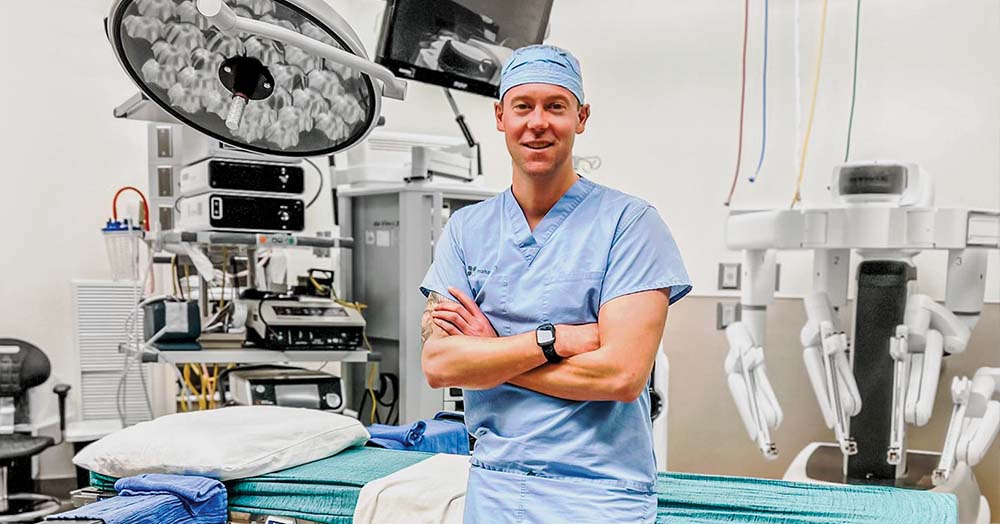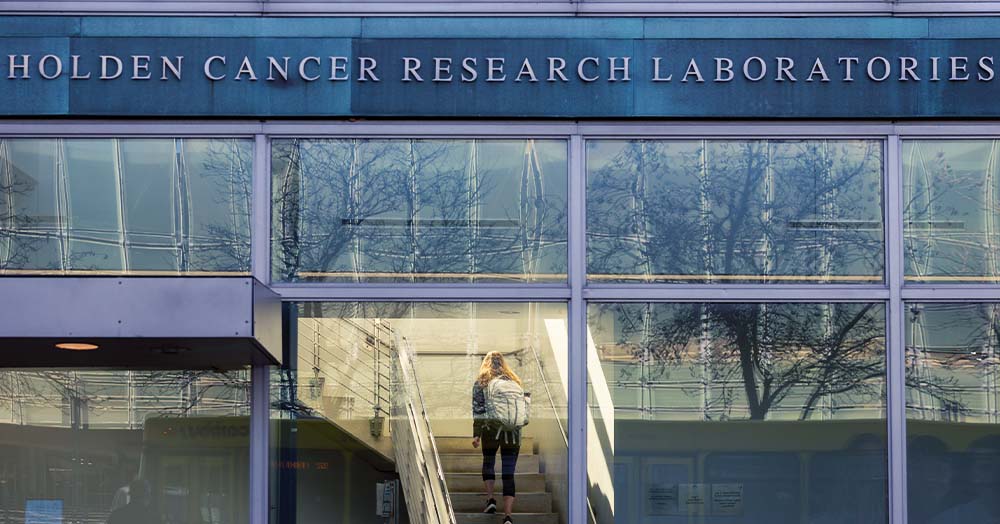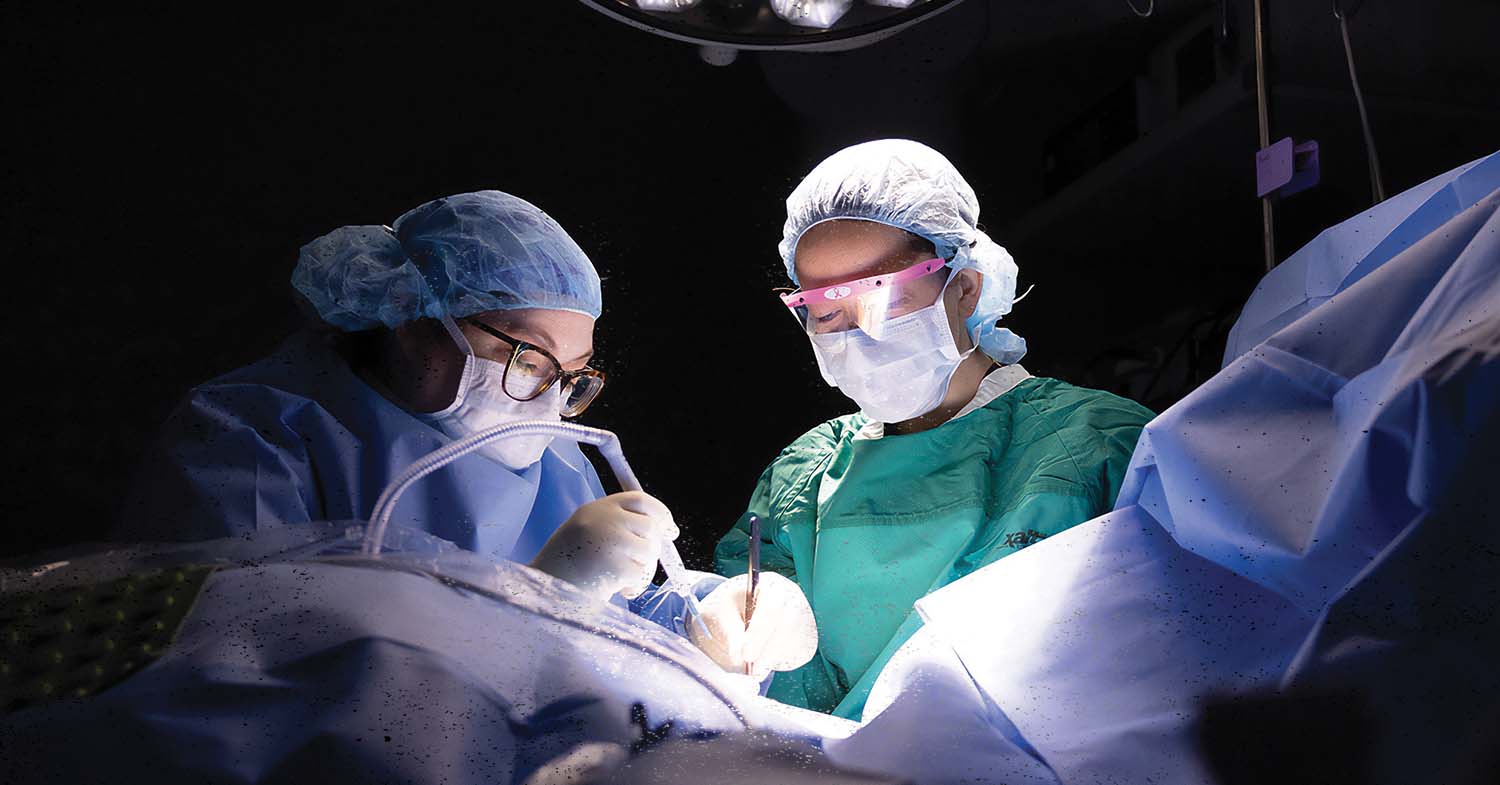A Clear Mission
 PHOTO COURTESY JESSE VAN MAANEN
Jesse Van Maanen (16MD), a general surgeon at Mahaska Health in Oskaloosa, Iowa, and part of the inaugural Carver Rural Iowa Scholars Program cohort, says he enjoys the familiarity and continuity of care that serving a small town offers.
PHOTO COURTESY JESSE VAN MAANEN
Jesse Van Maanen (16MD), a general surgeon at Mahaska Health in Oskaloosa, Iowa, and part of the inaugural Carver Rural Iowa Scholars Program cohort, says he enjoys the familiarity and continuity of care that serving a small town offers.
Statewide Health Support
The UI trains physicians to meet health care needs in rural Iowa, including for obstetric services and psychiatry.
A Rural Physicians Pipeline
The Association of American Medical Colleges predicts a shortage of up to 124,000 physicians across the U.S. by 2034, with some of the hardest-hit areas in rural communities where the population tends to be older and in need of the most care. By showing medical trainees the benefits of putting down roots in Iowa, a UI Carver College of Medicine program has helped close health care gaps throughout the state.
Since 2012, the Carver Rural Iowa Scholars Program has connected medical students with the resources to serve smaller Iowa communities. The curriculum is enhanced with clinical rotations in rural areas, an agricultural medicine class, and guest lecturers who discuss the ins and outs of rural practice. Students are each paired with a physician mentor who practices in a rural area. If they later complete residency training in a primary care specialty and practice in a small Iowa community, they are eligible to receive up to $100,000 in student loan repayment.
Closing the OB Care Gap
Since 2000, 31 Iowa counties—most of them rural—have closed their obstetric services, creating potentially dire consequences for pregnant mothers and their babies. Across Iowa, which has the fewest OBGYNs per capita of any U.S. state, expectant mothers often face long drives to get the care they need, particularly for high-risk pregnancies.
To address this growing problem, UI Health Care provides training to rural pockets throughout the state. The UI’s mobile simulation programs and outreach teams of doctors and nurses help local emergency room providers gain additional experience in delivering babies and treating complications.
UI Health Care also offers a rural obstetrician track for resident physicians interested in training and work with OBs in rural-based communities. “They can see themselves working in small towns because they experience it and work with people who do it and enjoy it,” says Andrea L. Greiner (19MHA), vice chair and clinical professor of obstetrics and gynecology.
Meeting Mental Health Needs
Iowa faces a critical shortage of mental health care providers, particularly in its small communities. As of 2022, 66% of the state’s psychiatrists worked in the three most populous Iowa counties, while 73 counties had no practicing psychiatrists at all.
The UI Department of Psychiatry is responding to that need through its Public and Rural Psychiatry Track. Through this program, resident physicians complete family medicine rotations in rural areas, collaborate with community agencies, participate in telepsychiatry services, and attend lectures and workshops on public and rural psychiatry. The UI Carver College of Medicine residents also partner with the state to provide support at several key mental health facilities in rural Iowa.
Similarly, the UI College of Education’s Telepsychology Training Clinic helps address the need for mental health care in rural areas. Staffed by counseling psychology doctoral trainees, postdoctoral scholars, and faculty, the clinic offers free short-term counseling via videoconferencing to Iowans with limited access to mental health services.
New Holden Director Shares Vision for Iowa
The center plans to make its cutting-edge treatments more accessible to cancer patients statewide.
Iowa has one of the fastest growing cancer rates in the country. It’s an alarming trend that’s top-of-mind for the clinical, research, and outreach teams with UI Health Care Holden Comprehensive Cancer Center.
And as the cancer center’s newly appointed director, Mark Burkard is looking at ways to advance patient-centered care in Iowa. Burkard—a physician scientist who was a faculty member at University of Wisconsin-Madison for the last 16 years—says UI Health Care is uniquely positioned to create a statewide cancer care network that brings Holden’s expertise closer to home for more Iowans.
“Holden Cancer Center is a well-known comprehensive cancer center in the national scene, and it’s been a National Cancer Institute-designated cancer center for more than 20 years, so there’s a very strong platform to build on,” Burkard says. “I see this role as an opportunity to work at an institution that’s already strong thanks to the people working at Holden Cancer Center—from the physicians to the nurses and support staff, to the clinical research staff, to the genetic counselors, the basic scientists, and the translational researchers.”
Iowa Magazine recently caught up with Burkard to discuss his plans for Holden Cancer Center.
What motivates you to work in the field of oncology?
I’ve spent many, many hours in oncology clinics getting to know patients, and you really make a strong connection with people as they face often the scariest thing in their lives. And what I see happening in the field of cancer, I’m just very excited about. We’re going from this era where we had very few treatments for people with incurable cancer to prolonging people’s lives profoundly.
We’re finding better ways of taking care of our cancer patients, whether it’s better medicines, better models of care, better radiation strategies, or surgeries that preserve quality of life. There’s been this steady progress. I like being part of this fast-moving field; it brings a lot of hope to our patients.
As Holden Cancer Center’s newest director, what is your vision for cancer care in Iowa over the next several years?
Cancer care is changing quickly. It’s evolving in many ways, and it’s getting more complicated. When I started, there was one treatment for melanoma. Now there are many effective treatments. It’s very challenging for a general oncologist to stay on top of all that is happening in the realm of cancer care. And then to offer cutting-edge treatments—whether it’s cellular therapy, a new immunotherapy, or a targeted drug—is even more challenging.
What we want to do as an academic health care system in a rural state is provide more support to oncologists across Iowa, so Iowans can get the best expert care in their communities. In Wisconsin, I created a statewide molecular tumor board, for example, and would like to find more ways for oncologists to collaborate on tumor boards. More advanced or experimental therapies like cellular therapy programs are important as we think about the future. And going forward, there are more ways to incorporate telehealth and treatments at home, particularly for rural Iowans. We know how important it is to deliver care locally, so Iowans don’t have to travel great distances.
Access seems to be a challenge as demand for cancer care continues to rise, particularly in rural parts of the state. Do you have a strategy for improving access to care?
There’s opportunity for a more streamlined approach to delivering cancer care, and that will take collaboration. When patients are seeing their surgeon or coming for their initial visit, it’s important to have coordinated visits with all their providers and the experts they need right from the start.
In October, we announced an agreement with Mission Cancer + Blood to create a comprehensive cancer care network uniquely positioned to tackle Iowa’s elevated cancer rates. The agreement provides opportunities for oncology specialists to work together to keep care local and increase access to cancer detection, treatment, and research across Iowa. By joining forces, we can provide more patients with access to comprehensive services, shortened time between diagnosis and treatment for rare and difficult cancers, and expanded options for the latest therapies offered as part of clinical trials.
For example, if we find a patient with a rare genetic variant and we have a powerful new medicine that could change their life, we can connect them to the right clinical trial right away. We want to be able to deliver the best care in a highly complex, changing field and do it closer to patients’ homes.
 PHOTO: LIZ MARTIN/UI HEALTH CARE
The UI plans to expand the space it dedicates to cancer research on campus with a new building.
PHOTO: LIZ MARTIN/UI HEALTH CARE
The UI plans to expand the space it dedicates to cancer research on campus with a new building.
A Focus on Cancer
Iowa’s New Home for Cancer Research
The UI plans to build a new cancer-focused research building on the west side of campus, expanding the Holden Comprehensive Cancer Center’s ability to perform state-of-the-art research and enhance existing collaborations among the university’s health sciences colleges and programs.
“This project reflects the deep commitment of the university in supporting the needs of our state through education and research,” says UI President Barbara Wilson. “Building new labs that support our faculty, staff, and trainees will move forward research that will impact the lives of Iowans.”
Two locations are being considered for the new project: the Medical Education Building site and the Westlawn site, both previously identified in the university’s 10-year master plan. A formal space analysis for the research building will take place over the next few months.
A Statewide Network
Six hospitals that serve rural populations across Iowa participate in the Iowa Cancer Affiliate Network, which connects them with experts at the UI Health Care Holden Comprehensive Cancer Center for guidance and support. Holden researchers and clinicians provide the affiliate hospitals with population-specific reports, assistance with data collecting, strategic planning guidance, educational opportunities and training, and access to clinical trials.
Registry Shines Light on Disease
For more than 50 years, the UI-based Iowa Cancer Registry has tracked cancer cases, survival rates, and deaths to inform research and improve prevention and treatment. The registry’s data has revealed that Iowa has the second-highest cancer rate in the nation and is the only state where cancer rates are increasing. Iowa also ranks second in cancer rates and third for cancer deaths in the Black population. Other trends are positive, including that Iowa’s number of cancer survivors is rising, led by breast-cancer patients.

